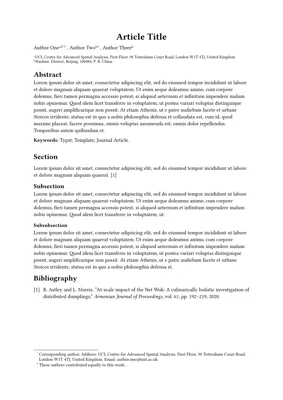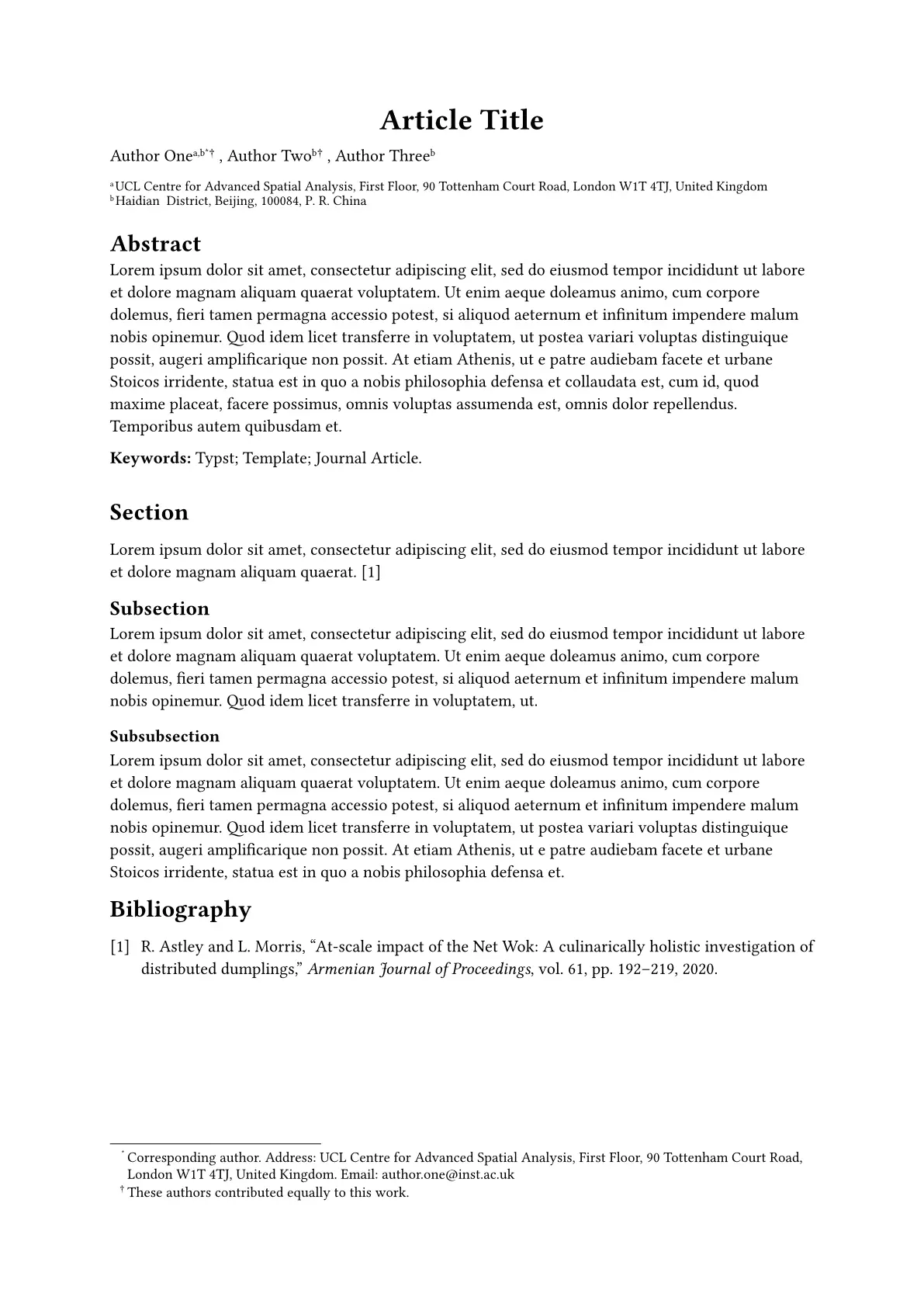This package provides a template for writing journal articles to organise authors, institutions, and information of corresponding authors.
Usage
Run the following command to use this template
typst init @preview/starter-journal-article
Documentation
article
The template for creating journal articles. It needs the following arguments.
Arguments:
title: The title of this article. Default:"Article Title".authors: A dictionary of authors. Dictionary keys are authors’ names. Dictionary values are meta data of every author, including label(s) of affiliation(s), email, contact address, or a self-defined name (to avoid name conflicts). The label(s) of affiliation(s) must be those claimed in the argumentaffiliations. Once the email or address exists, the author(s) will be labelled as the corresponding author(s), and their address will show in footnotes. Functionauthor-meta()is useful in creating information for each author. Default:("Author Name": author-meta("affiliation-label")).affiliations: A dictionary of affiliation. Dictionary keys are affiliations’ labels. These labels show be constent with those used in authors’ meta data. Dictionary values are addresses of every affiliation. Default:("affiliation-label": "Affiliation address").abstract: The paper’s abstract. Default:[].keywords: The paper’s keywords. Default:[].bib: The bibliography. Accept value from the built-inbibliographyfunction. Default:none.template: Templates for the following parts. Please see below for more informationstitle: (title) => {}: how to show the title of this article.author-info: (authors, affiliations) => {}: how to show each author’s information.abstract: (abstract, keywords) => {}: how to show the abstract and keywords.bibliography: (bib) => {}: how to show the bibliography.body: (body) => {}: how to show main text.
author-meta
A helper to create meta information for an author.
Arguments:
..affiliation: Capture the positioned arguments as label(s) of affiliation(s). Mandatory.email: The email address of the author. Default:none.alias: The display name of the author. Default:none.address: The address of the author. Default:none.cofirst: Whether the author is the co-first author. Default:false.
appendix
A helper to show contents as appendices.
- Heading numbers are shown in capital letters with a prefix “Appendix”.
- Appendix numbers are prepended to figure (and table, etc.) numbers.
Usage:
#show: appendix
suffix
A helper to show contents after the main text but before the appendix. The only behavior of this function is to hide the heading numbers.
Usage:
#show: suffix
booktab
A helper to create three-line tables.
This function is a wrapper of the built-in table function.
It adds a top line and a bottom line to the table,
and a middle line under the first row by default.
Arguments:
..args: Capture the positioned arguments as the table contents. Mandatory.top-bottom: The stroke of the top and bottom lines. Default:1pt.mid: The stroke of the middle line. Default:0.5pt.
Usage:
#booktab(
columns: 3,
rows: 3,
..((lorem(2),) *9)
)
Default templates
The following code shows how the default templates are defined.
You can override any of the by setting the template argument in the article() function to customise the template.
#let default-title(title) = {
show: block.with(width: 100%)
set align(center)
set text(size: 1.75em, weight: "bold")
title
}
#let default-author(authors) = context {
show: block.with(width: 100%)
let (gettext, locale) = i18n(text.lang)
set text(cjk-latin-spacing: none)
authors.map(author => {
[#author.name#super(author.insts.map(it => numbering("a", it + 1)).join(","))]
if author.corresponding {
footnote[
#gettext("corresponding.note")
#strfmt(gettext("corresponding.address"), address: author.address)
#if author.email != none {
[#strfmt(gettext("corresponding.email"), email: author.email)]
}
]
}
if author.cofirst == "thefirst" [
#footnote(gettext("cofirst")) <fnt:cofirst-author>
] else if author.cofirst == "cofirst" [
#footnote(<fnt:cofirst-author>)
]
}).join(gettext("comma"))
}
#let default-affiliation(affiliations) = {
show: block.with(width: 100%)
set text(size: 0.8em)
set par(leading: 0.4em)
affiliations.enumerate().map(((ik, address)) => {
super(numbering("a", ik + 1))
h(1pt)
address
}).join(linebreak())
}
#let default-author-info(authors, affiliations, styles: (:)) = {
let styles = (
author: default-author,
affiliation: default-affiliation,
..styles
)
(styles.author)(authors)
let used_affiliations = authors.map(it => it.insts).flatten().dedup().map(it => affiliations.keys().at(it))
(styles.affiliation)(used_affiliations.map(it => affiliations.at(it)))
}
#let default-abstract(abstract, keywords) = context {
let (gettext, locale) = i18n(text.lang)
// Abstract and keyword block
if abstract != [] {
heading(gettext("abstract"), numbering: none, outlined: false)
par(first-line-indent: 1em, abstract)
if keywords.len() > 0 {
strong(gettext("keywords.title"))
strfmt(gettext("keywords.text"), keywords: keywords.join(gettext("keywords.sep")))
}
}
v(1em)
}
#let default-body(body) = context {
let (gettext, locale) = i18n(text.lang)
show heading.where(level: 1): set block(above: 1em, below: 1em)
set par(first-line-indent: 1em)
set figure(placement: top)
set figure.caption(separator: ". ")
show figure.where(kind: table): set figure.caption(position: top)
set footnote(numbering: "1")
body
}
Example
See the template for full example.
#show: article.with(
title: "Artile Title",
authors: (
"Author One": author-meta(
"UCL", "TSU",
email: "author.one@inst.ac.uk",
),
"Author Two": author-meta(
"TSU",
cofirst: true
),
"Author Three": author-meta(
"TSU"
)
),
affiliations: (
"UCL": "UCL Centre for Advanced Spatial Analysis, First Floor, 90 Tottenham Court Road, London W1T 4TJ, United Kingdom",
"TSU": "Haidian District, Beijing, 100084, P. R. China"
),
abstract: [#lorem(100)],
keywords: ("Typst", "Template", "Journal Article"),
bib: bibliography("./ref.bib")
)

Custom title
#show: article.with(
title: "Artile Title",
authors: (
"Author One": author-meta(
"UCL", "TSU",
email: "author.one@inst.ac.uk",
),
"Author Two": author-meta(
"TSU",
cofirst: true
),
"Author Three": author-meta(
"TSU"
)
),
affiliations: (
"UCL": "UCL Centre for Advanced Spatial Analysis, First Floor, 90 Tottenham Court Road, London W1T 4TJ, United Kingdom",
"TSU": "Haidian District, Beijing, 100084, P. R. China"
),
abstract: [#lorem(100)],
keywords: ("Typst", "Template", "Journal Article"),
bib: bibliography("./ref.bib"),
template: (
title: (title) => {
set align(left)
set text(size: 1.5em, weight: "bold", style: "italic")
title
}
)
)

Custom author infomation
#show: article.with(
title: "Artile Title",
authors: (
"Author One": author-meta("UCL", email: "author.one@inst.ac.uk"),
"Author Two": author-meta("TSU")
),
affiliations: (
"UCL": "UCL Centre for Advanced Spatial Analysis, First Floor, 90 Tottenham Court Road, London W1T 4TJ, United Kingdom",
"TSU": "Haidian District, Beijing, 100084, P. R. China"
),
abstract: [#lorem(20)],
keywords: ("Typst", "Template", "Journal Article"),
template: (
author-info: (authors, affiliations) => {
set align(center)
show: block.with(width: 100%, above: 2em, below: 2em)
let first_insts = authors.map(it => it.insts.at(0)).dedup()
stack(
dir: ttb,
spacing: 1em,
..first_insts.map(inst_id => {
let inst_authors = authors.filter(it => it.insts.at(0) == inst_id)
stack(
dir: ttb,
spacing: 1em,
{
inst_authors.map(it => it.name).join(", ")
},
{
set text(0.8em, style: "italic")
affiliations.values().at(inst_id)
}
)
})
)
}
)
)

Custom abstract
#show: article.with(
title: "Artile Title",
authors: (
"Author One": author-meta("UCL", email: "author.one@inst.ac.uk"),
"Author Two": author-meta("TSU")
),
affiliations: (
"UCL": "UCL Centre for Advanced Spatial Analysis, First Floor, 90 Tottenham Court Road, London W1T 4TJ, United Kingdom",
"TSU": "Haidian District, Beijing, 100084, P. R. China"
),
abstract: [#lorem(20)],
keywords: ("Typst", "Template", "Journal Article"),
template: (
abstract: (abstract, keywords) => {
show: block.with(
width: 100%,
stroke: (y: 0.5pt + black),
inset: (y: 1em)
)
show heading: set text(size: 12pt)
heading(numbering: none, outlined: false, bookmarked: false, [Abstract])
par(abstract)
stack(
dir: ltr,
spacing: 4pt,
strong([Keywords]),
keywords.join(", ")
)
}
)
)

Internationalisation and Localisation
[!IMPORTANT] This feature is introduced since version
0.5.0. The default language is still English.
For different language users, default templates vary when they set the document’s language by:
#set text(lang: "xx")
Supported languages:
- English (
en) - Chinese (
zh)
Users can still customise the templates.
Example:

Changelog
0.5.1
Improvements:
- Fix: the numbering of affiliations
0.5.0
Breaking changes:
- Template interface for
author-info,authorandaffiliationis changed.author-info:(authors, affiliations, styles: (:)) => {}This function use the styles provided instylesor default styles to show authors and affiliations.author:(authors) => {}This function now accepts a list of authors.affiliation:(affiliations) => {}This function now accepts a list of used affiliations.
New features:
- Add support for internationalisation and localisation for the following languages:
- English (
en) - Chinese (
zh)
- English (
Improvements:
- Fix: show “Abstract” with no numbering and not outlined
0.4.0
Breaking changes:
- Affiliation labels are now shown with alphabetic characters instead of numbers.
- Parameter
bibis removed. Users should use the built-inbibliographyfunction to create a bibliography in the right place.
New features:
- A
appendixfunction is added to show contents as appendices. - A
suffixfunction is added to show additional contents before the appendix. This is useful when heading numbers are shown but need to be hide for the “suffix” part. - A
booktabfunction is added to create three-line tables.
Improvements:
- A 1em space is added beneath the abstract and keywords.
- The
placementargument of thefigurefunction is set totopby default. - The separator between figure labels and captions is changed to a period followed by a space.

